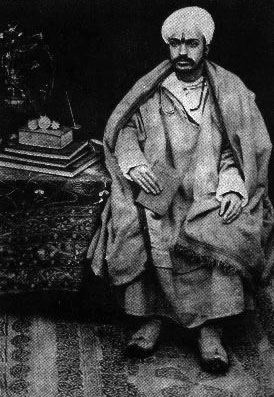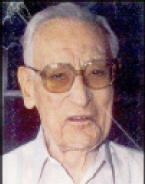|
|






|
 |
|
 |
 |
 |
 |
Faces of
Glory: Kashmiri Pandit
Personalities
 Nityanand
Shastri Nityanand
Shastri
NS was
not only just an
academician, he was equally active
in the social and cultural fields.
While being the president of
Sanskrit Sahitya Parishad, a
Sanskrit literary organisation he
founded in 1930, he also
established a charitable trust
named Vanita Ashram to help widows
and destitutes.
>>>
|
|
 Pandit
Govind Kaul Pandit
Govind Kaul
A
profound Kashmiri scholar of the
late 19th century. Pandit Govind
Kaul, who rendered most valuable
assistance to Aurel Stein in
translating Rajatarangini, is
today almost a forgotten man.
There are hardly a handful of
Kashmiri Pandits who may be aware
of his great erudition and the
range of his scholarly pursuits.
>>>
|
|
|
|
 Pandit
Mukund Ram Shastri Pandit
Mukund Ram Shastri
From
archaeology and paleography to
Kashmir history to Kashmir
Shaivism to grammar and literature
Mahamahopadhyaya Pandit Mukund Ram
Shastri (MRS) strode like a
colossus in almost every field of
Kashmir studies at the turn of the
19th century and in the early
years of the twentieth.
>>>
|
|
 Pandit
Sahaz Bhat Pandit
Sahaz Bhat
The
legendary Unani hakim of Kashmir,
Pandit Sahaz Bhat, was a profound
scholar also. His miracle cures
remain etched on public memory and
have given to Kashmiri parlance a
proverb commonly used even now.
>>>
|
|
|
|
 Pandit
Harabhatta Shastri Pandit
Harabhatta Shastri
Pandit
Harabhata Shastri (HBS) is a name
surrounded by a brilliant
scholastic aura, though known to
very small group of Sanskrit
scholars of Kashmir. >>>
|
|
 Pandit
Keshav Bhatt Jyotishi Pandit
Keshav Bhatt Jyotishi
A
profound scholar of astrology and
a pioneer printer in one - that
was Pandit Keshav Bhatt Jyotishi.
>>>
|
|
|
|
 Pandit
Anand Koul Pandit
Anand Koul
When
Pandit Anand Koul published his
first book, 'The Kashmiri Pandit'
in 1924, a pioneering work on the
history and ethnography of the
Kashmiri Pandits, he created
history. >>>
|
|
 Prof.
Jagaddhar Zadoo Prof.
Jagaddhar Zadoo
He
was a titan among scholars of
Kashmir -- that is alone how Prof.
Jagaddhar Zadoo (JDZ) can he
described for his immense
contribution to Sanskrit
scholarship.
>>>
|
|
|
|
 Pandit
Prem Nath Shastri Pandit
Prem Nath Shastri
Pandit
Prem Nath Shastri’s role during
his life time did not remain
confined to just carrying ahead a
family tradition but in
institutionalising it in such a
way that its relevance in the
social life of Kashmiri Pandits
only increased with each day.
>>>
|
|
 Master
Samsar Chand Kaul Master
Samsar Chand Kaul
Master
Samsar Chand Kaul (1883-1977) was
a renowned educationist,
ornithologist and environmentalist
of his time, when subjects like
bird watching and study at natural
history was unknown in Kashmir.
>>>
|
|
|
|
 Shri
Jankinath Kaul 'Kamal' Shri
Jankinath Kaul 'Kamal'
Shri
Jankinath Kaul 'Kamal' was well
known as an accomplished scholar
through his writings in the fields
of Kashmir Shaivism and Vedanta,
which have received countrywide
recognition. >>>
|
|
 Dinanath
Yaksh Dinanath
Yaksh
The Sanskritic Shastras have survived in
India as a part of the Vedic ritualistic culture. The Vedic ritualism has
been a text-based culture. In the development of this ritual-culture a
variety of sciences emerged as a part of it thus making it richer. These
sciences were a part of a living tradition survived by the respective
experts called Pandits.
>>>
|
|
|
|
|
 Pt.
Rameshwar Nath Kao,
the founder of India’s external intelligence agency,
R&AW, was no ordinary
spymaster. He was one of the architects of modern India. His yeoman
services to the country in the field of intelligence
and national security
remain unsurpassed. When Kao was alive Prof. ML Sondhi, a great admirer of his,
used to describe him as a ‘living legend’. >>> Pt.
Rameshwar Nath Kao,
the founder of India’s external intelligence agency,
R&AW, was no ordinary
spymaster. He was one of the architects of modern India. His yeoman
services to the country in the field of intelligence
and national security
remain unsurpassed. When Kao was alive Prof. ML Sondhi, a great admirer of his,
used to describe him as a ‘living legend’. >>>
|
|
|
|
|
|
 Pandit
Ishwar Kaul
Pandit
Ishwar Kaul
Pandit Ishwar Kaul assured for himself an
esteemed place in the galaxy of Kashmiri scholars by giving Kashmiri its first
grammar - the 'Kashmir Shabdamrita'. Written in Sanskrit after the manner of the
great Sanskrit grammarian Panini, Ishwar Kaul's treatise on Kashmiri grammatical
forms bears testimony to his profound study of the language.
>>>
|
|
 Damodar
Damodar
Pt. Damodar, son of the illustrious Pt. Sahib
Ram Kaul and younger brother of the
equally renowned Pandit Daya Ram, was a
Sanskrit scholar gifted with unusual
brilliance. His scholastic endowments
greatly impressed both George Buhler and
Aurel Stein who have paid very handsome
tributes to his genius.
>>>
|
|
|
|
 Kalhana
Kalhana
Chronicle-writing is not foreign
to the imagination of the Kashmiri Brahmins. A
host of histories Charitas and Mahatmyas amply
testify to this assertion. However, the history as
it is taken in the modern parlance, is absent in
Sanskrit literature. History is not an account of
rise and fall of kings but should embrace in its
ambit the political, social and religious
attainments and aspirations of the people at
large.
>>>
|
|
 Shrivara
Shrivara
Without beating about the
bush, Shrivara straightway adduces two reasons for
taking up the thread of chronicle-writing from
Jona Raja. Firstly, be writes "I have taken
this assignment simply to complete the unfinished
History of Kings written by Jona Raja, whose
disciple I am". At the same time he, in all
humility, confesses his diffidence, to reach up to
his guru's heights.
>>>
|
|
|
|
 Jonaraja
Jonaraja
Jona Raja at the very
commencement of his Raja Tarangini acknowledges
the debt he owes to Kalhana - the doyen of
chroniclers of Kashmir. He treats him as hig ideal
and his reputed dictum in respect of history
writing as his guide-line for supplementing
suitably the course of events, where Kalhana had
left it.
>>>
|
|
 Bilhana
Bilhana
Kashmir of yore has been the cradle of
Sanskrit lore and learning. From 9th century A. D. to 12th century A. D.
brightest luminaries in Sanskrit literature have shone on its firmament.
These four hundred years, roughly speaking, form the crux and the
culmination of what may be called the creative and original literary
activity of Kashmiris in the realm of Sanskrit language and
literature.
>>>
|
|
|
|
 Ksemendra
Ksemendra
Sanskrit poets and literary
luminaries have been often accused of oriental
hyperbole. It may be conceded that by and large
such devotees of Muse did indulge in some kind of
exaggeration which became nauseating at times;
such kind of poetic fancy becomes pronounced when
they had to extol their patrons, heroes or even
their beloveds.
>>>
|
|
 Pandit
Saheb Ram Kaul
Pandit
Saheb Ram Kaul
Among
the Kashmiri scholars of Sanskrit whom Maharaja
Ranbir Singh respected greatly was Pandit Saheb
Ram Kaul, a deeply learned man whose study
of the Shastras had impressed even the veteran
Pandits of Varanasi.
>>>
|
|
Articles
Reproduced From:
|
|
|
|
 |
 |
|
 |
|
|
|
|
|
|
